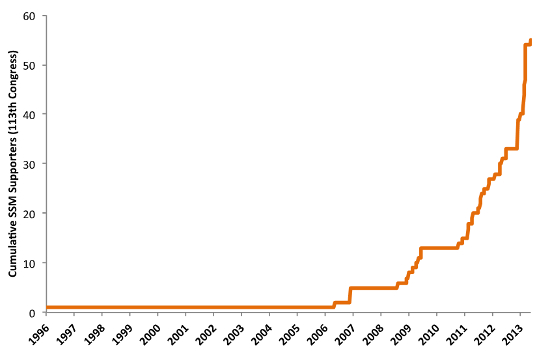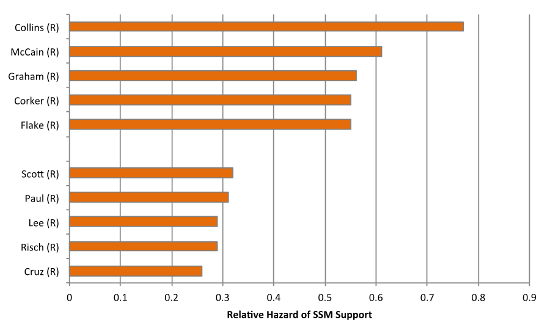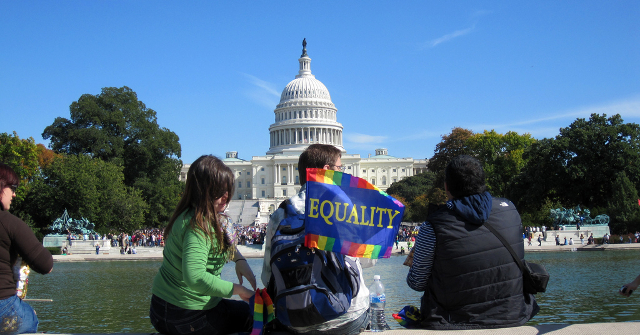
 In the last few years, state after state and senator after senator have declared their support for full marriage equality. Such momentum suggests that the goals of same-sex marriage advocates will be realized sooner rather than later. In new research, Sean Theriault and Herschel Thomas analyze when senators announce their support for same-sex marriage. Contrary to the popularly held belief that their decisions will quickly snowball into filibuster-proof numbers, they find that most of the easy successes have already been achieved.
In the last few years, state after state and senator after senator have declared their support for full marriage equality. Such momentum suggests that the goals of same-sex marriage advocates will be realized sooner rather than later. In new research, Sean Theriault and Herschel Thomas analyze when senators announce their support for same-sex marriage. Contrary to the popularly held belief that their decisions will quickly snowball into filibuster-proof numbers, they find that most of the easy successes have already been achieved.
The march toward full marriage equality for same-sex couples seems to take a step every day. By deciding against hearing cases bubbling up from the circuit courts last month, the U.S. Supreme Court implicitly extended same-sex marriage to 11 new states. Even Utah and West Virginia have handed out same-sex marriage certificates. Political commentators have stopped asking “if” and have begun asking “when.”
As a sign of its inevitability, Al Madrigal, of “The Daily Show with John Stewart,” did a segment on October 29, 2013, on which state – Alabama or Mississippi – would be the last to permit same-sex marriage. By the time that the Supreme Court struck down Defence of Marriage Act in 2013, the public’s opinion had almost completely reversed from the time that the questions became a regular item tested in public opinion surveys. More recent surveys of the American public show that support is now firmly in front of opposition. As a growing proportion of older voters change their opinion on the issue and younger Americans (who tend to support same-sex marriage at least two to one) enter the ballot booth, it appears this shift will continue.
A similar trend has become increasingly visible in the public announcements of same-sex marriage by elected officials, and among U.S. senators in particular. As originally compiled by Dylan Matthews and reported on the Washington Post’s “Wonkblog,” 63 senators—55 of whom were serving in December 2013 during the 113th Congress—switched their position from not supporting same-sex marriage to supporting it while in office. None have traveled on the other side of the road from support to opposition. Figure 1 plots the development of this support since 1996 among these 55 senators.
Figure 1 – The Rise of Support for Same-sex Marriage Among U.S. Senators (113th Congress Only)

What “The Daily Show” segment and the senators’ announcements do not appreciate is that the states and senators most likely to support same-sex marriage already do. The remaining lists of senators and states suggest that the hard work for those in favor of full marriage equality has just begun.
As former senators who later announced support for same-sex marriage, President Barack Obama and Vice President Joe Biden highlight that the key question is not the position that they take on the issue, but the evolution of their position over time. In our research, we use event history analysis to understand when senators announce their support for same-sex marriage (if they do). We find that the process underlying senators’ announcements of switching from opposing to supporting same-sex marriage appears quite systematic. The variables that we think matter—ideology, partisanship, and constituency pressures—do matter.
Much like Nate Silver did for Al Madrigal on “The Daily Show,” we can use our initial analysis to examine the list of senators who have not yet publicly supported same-sex marriage. By calculating the ‘relative hazard’ of each senator’s potential support, we are able to reveal who among those who have not yet announced their support are most ‘at risk’ to switch to supporting marriage equality based on their particular political situations.
Among the three Democrats who had not yet announced their support, Mary Landrieu is the most likely to announce a change in her position, which is consistent with her public pronouncements suggest that she, personally, supports same-sex marriage, but that she feels bound to represent her constituents who are still majority opposed. Our model suggests that the others remaining Senate Democrats, Mark Pryor and Joe Manchin, should not be far behind in announcing their support.
Though with substantially lower levels of risk than the Democrats in our analysis, we also rank those remaining Republican senators who do not yet support same-sex marriage. Shown in Figure 2, among the Republicans with the highest ‘hazard’ of supporting same-sex marriage are Susan Collins, John McCain, Lindsey Graham, Bob Corker, and Jeff Flake. We also include those five senators with the lowest risk of supporting same-sex marriage. At the bottom of the list was Ted Cruz, who incidentally, was the first senator to ridicule the Supreme Court for side stepping the issue. Just behind him were Mike Lee and Jim Risch, both well-known opponents of marriage equality.
Figure 2 – The Relative Hazard of Support for Same-Sex Marriage (Top 5 and Bottom 5 Republican Senators)

Contrary to the news reports suggesting that same-sex marriage will become the law of the land sooner rather than later, our analysis shows that the fight for increased support in the U.S. Senate is far from over. While potential announcements from the three remaining Democratic senators suggest that the number of supporters could climb to 58, winning the support of two additional senators is likely to be much harder this congress. With each Democratic seat loss on election day, the road becomes even steeper. Proponents’ only hope may be the eventual replacement of opponents by supporters in future elections while maintaining their current crop of supporters – or decisive action by the Supreme Court.
This article is based on the paper, “The Diffusion of Support for Same-sex Marriage in the US Senate,” in PS: Political Science and Politics.
Featured image credit: VJnet (Flickr, CC-BY-NC-2.0)
Please read our comments policy before commenting.
Note: This article gives the views of the author, and not the position of USApp– American Politics and Policy, nor of the London School of Economics.
Shortened URL for this post: http://bit.ly/1x3hxtu
_________________________________
 Sean Theriault – University of Texas at Austin
Sean Theriault – University of Texas at Austin
Sean Theriault is an Associate Professor in the Department of Government at the University of Texas at Austin. He researches American political institutions, primarily the U.S. Congress. His current research is on the Gingrich Senators and how they have transformed the U.S. Senate.
_
 Herschel Thomas – University of Texas at Austin
Herschel Thomas – University of Texas at Austin
Herschel Thomas is a PhD Candidate in the Department of Government at the University of Texas at Austin. He studies American politics and the policy process, focusing on agenda-setting, interest groups, and lobbying.



